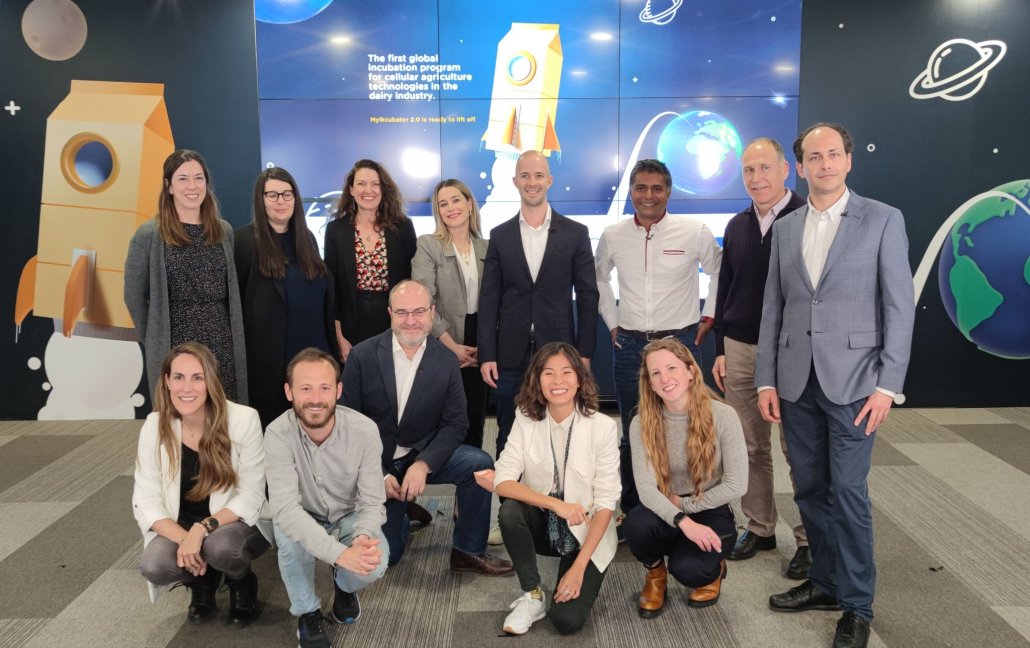Get your calendars ready for all the exciting foodtech events in 2022!
2021 proved the industry’s resilience when faced with a global pandemic by quickly shifting years of dynamic face-to-face events to an online format in a matter of months. Thankfully, we are slowly getting back to a pre-covid world and foodtech events all over the globe will mostly offer a hybrid in-person and online experience.
January
January 18-20
Fermentation-Enabled Alternative Protein Summit
This is the only industry-led event designed to scale-up production platforms to commercialize clean-label, animal-free, and regulatory-approved alternative meat, dairy, eggs, and functional protein ingredients. The in-person event will explore key challenges and opportunities in the successful commercialization of fermentation-enabled alternative proteins for human consumption.
March
March 8-10
The Future of Protein Production Summit
The Future of Protein Production Summit is an event targeting companies involved in making the global food system more sustainable. Over 1000 attendees are expected to converge online for the three-day virtual conference, which will showcase the latest research and trends to help develop sustainable production technologies and exploration of highly sustainable processes and solutions to help make the global food system more sustainable, kind, and fair for the planet, people, and animals.
Use our exclusive code FPPEAA20 to save 20% off your ticket.
March 22-23
World Agri-Tech Innovation Summit
The event will take place in San Francisco and will gather 1,300+ global agri-food corporates, investors, and technology start-ups from around the world to uncover the most exciting innovations in the agri-food sector and to forge the right partnerships to take those solutions to market.
March 24-25
Future Food-tech San Francisco
The Future Food-Tech Summit has become the annual meeting place for the global food-tech ecosystem. Food brands, active investors, start-ups, and technology leaders come together to exchange insights, be inspired, and identify future partners.
You will be able to join in-person or online as it is a hybrid summit. This allows you to meet and collaborate on the same platform, opening up the summit to a bigger global network than ever before.
Use our exclusive code EA10 to save 10% off a delegate pass.
April
April 4-7
Alimentaria
Alimentaria is an international event of reference that takes place in Barcelona, Spain, for all professionals in the food, beverage, and foodservice industry that allows the attendees to be up-to-date with the latest food industry trends, promoting internationalization, innovation, gastronomy, and sector specialization.
April 27-29
Anuga Foodtec
As the leading global trade fair, Anuga FoodTec, taking place in Cologne or online, is the most important source of impetus for the international food and beverage industry. As the world’s only supplier fair, it covers all aspects of food production. Here, the industry presents its latest innovations and technological visions – from process technology to filling and packaging technology to food safety, from packaging materials to digitalization and intralogistics. And beyond that, there’s plenty more to discover.
May
May 4-5
Rethinking Materials 2022
Join a world-class gathering of visionary CPG Brands, Retailers, Producers, Converters, Regulators, Innovators, and Investors focused on scaling bio-based and circular solutions in plastics & packaging. Whether in-person in London or online anywhere in the world, all delegates will be able to meet and collaborate on the same platform.
Use our exclusive code EatableAdventures10 to get 10% off your ticket.
May 10-12
Bridge2Food Plant-Based Foods & Proteins Summit Americas
Bridge2Food brings together key leaders from all along the value chain who are working to drive transformation. Join the three-day event to learn the latest innovations and research, find solutions and strategies, grow your network, and discover where the plant-based sector is heading next.
May 12-13
FoodHack Summit 2022
A 2-day event in Lausanne bringing together the world’s best and brightest food tech founders, leaders, and innovators. You will network with the best and brightest minds in FoodTech, discover upcoming startups and taste the latest industry innovations.
Use our exclusive code EATABLE-15 for a 15% discount on all ticket types.
May 16-17
New Food Forum
The New Food Forum at Frankfurt, is a bite-sized item on the program of the newly established IFFA Factory area, providing insights into the developments in the alternative-protein sector at IFFA, the world’s leading trade fair for the meat industry.
May 17-19
Food4Future
Food 4 Future, in Bilbao, is the place to be for any professional in the food industry and its value chain, where you can acquire the latest and most promising food technology applications, robotics and automation, data technology or processing techniques. The event aims to be the platform to discover the latest innovations and trends that are driving the transformation of the food industry.
May 18-19
F&A Next
F&A Next is about thought leadership and connecting promising start-ups and scale-ups, dedicated to food & agtech investors and innovative corporates. Expect top executives and opinion leaders to discuss the impact of innovation in the agrifood industry and consumer behavior. Plus, selected startups will be presented as the Next Heroes in Food- & AgTech.
June
June 1-2
Sweden Foodtech BigMeet
Expect five days of bold ideas, stunning demos, and insightful comments galore! You will meet key actors in the private sector, government, and grassroots initiatives.
Use our discount code BIGMEET20 for a 20% discount on your ticket.
June 13-14
Food Innovate Milan
Join a global network of food innovators and discover how to distinguish your product in a saturated market, achieve a cleaner label without sacrificing taste or tradition, discover and define the latest trends in consumer behavior and buying patterns across the world, enhance product formulation with some of the most innovative and exciting ingredients, plan your product life-cycle journey with break-through technologies, and much more!
Use our discount code EA895 for more than 50% off your ticket.
This code will need to be inserted on the third page of the booking form, where it says ‘Enter promotional code’.
June 20-22
Bridge2Food Plant-Based Foods & Proteins Summit Europe
Bridge2Food brings together key leaders from all along the value chain who are working to drive transformation. Join the three-day event to learn the latest innovations and research, find solutions and strategies, grow your network, and discover where the plant-based sector is heading next.
June 21-22
Future Foodtech Alternative Proteins
Future Foodtech Alternative Proteins will take place in New York, connecting global food leaders to map out the future of protein. They will be focusing on three key pillars: plant-based, cell-based, and microbial fermentation. You should expect different discussions that will explore all facets of alternative proteins, providing a comprehensive overview of key players, markets, and solutions, handling topics from ingredient discovery and product formulation to regulation, communication, and commercialization
June 28-29
World Agritech Latam
World Agri-Tech Latam will connect international agri-food leaders to advance financial and environmental sustainability across the value chain. Join this event in São Paulo!
September
August 30 – September 1
Industrializing Cultivated Meats & Seafood Summit
Industrializing Cultivated Meats & Seafood will host the industry leaders from Food Techs, Investors, Multinational Consumer Packaged Goods, and Food Brands and Manufacturers, to focus on preparing for Cultivated Meat & Seafood Commercialization.
If you are creating a new cultivated meat or seafood product, looking to scale-up your current process to the industrial level, waiting on regulatory approval to go to market, or wishing to build new partnerships to optimize your processes, this is the go-to forum to attend in person in 2022.
September 16-19
Edible Planet Ventures
The Edible Planet Ventures Summit in Italy brings industry leaders and activists together alongside visionaries and change-makers, to set the table for a radically different food system.
Coming from all corners of the globe and all points in the food chain, our participants are a symbol of the progress that can be achieved through collaboration and innovation.
September 20-21
World Agri-Tech Innovation Summit London
World Agri-Tech will bring together leading agribusinesses, co-operatives, CPG brands, entrepreneurs, investors, and policy makers to accelerate the transition to sustainable and resilient agri-food systems.
Two days of full in-person sessions and networking including panel debates, roundtables, fireside chats, start-up pitching and 1-1 meetings.
Use code EAFRIEND to get an extra 10% off ticket price.
September 22-23
Future Food-Tech London
Join 500+ C-Suite food brand executives, investors, and entrepreneurs from around the globe working together to scale solutions in health, nutrition, and alternative proteins. The next Future Food-Tech event will be in London!
Use our codeEA10 to get an extra 10% off ticket price.
September 27-29
VertiFarm
VertiFarm is making its début as the first and only dedicated trade show for Vertical Farming & New Food Systems. Starting in 2022, Messe Dortmund is filling this gap, bringing together knowledge, technology, R&D and networking opportunities at the heart of the Ruhr, one of Germany’s key logistics hubs.
Secure one of the exclusive 250 tickets for the Summit now, with free access to the exhibition and complimentary catering. Help shape the future of Vertical Farming and New Food Systems!
September 29-30
New Food Conference
The New Food Conference is a unique, industry-oriented event that aims to accelerate and empower these innovative food technologies by bringing together key stakeholders. The New Food Conference team is excited to welcome leading pioneers in the alternative-protein realm to Berlin – on-site and in-person – with a program packed with insights, an exhibition space, a startup area, food tastings, and loads of networking opportunities.
October
October 3-8
Festival dell’Innovatzione Agroalimentare
The Festival is a 6 day online event created by FoodHub Magazine to share the latest innovations in Italian agrifood stakeholders.
It is the origin point of the MOVEMENT that brings together professionals from scientific research and industry to innovate in the agri-food sector.
At Food Hub, they care about the agri-food sector. As a benefit company, they are committed to making the latest innovations in the agri-food sector accessible to the market, believing in the sector, and investing in the professional growth of all agri-food stakeholders. For these reasons you can participate in the Festival for free.
October 4-5
NutrEvent
NutrEvent is the leading European business convention dedicated to innovation in Food, Feed, Nutrition and Health gathering 650 actors from research to market, with the objective to promote today’s products, process and services and identify tomorrow’s innovations.
The event will be hybrid, you can attend in person on October 4-5 (Nantes, France), or you can connect to the 100% online event on October 11.
October 17
Boosting alternative protein in Spain
The first FoodHack meetup in Madrid with prominent guests from the new protein sector: Heura, Pink Albatross, Innomy, Zyrcular Foods.
This is a great business opportunity. People, consumers are increasingly aware of the impact of their food, both in terms of the environment and in terms of health, so they are increasingly demanding food according to their concerns and lifestyles.
Those attending the first FoodHack Meetup in Madrid will have the opportunity to hear stories of successful entrepreneurs working on the future of food from Spain.
The event is free but registration is required.
October 26-28
Asia Pacific Agri-Food Innovation Summit
In its fourth year, the Asia-Pacific Agri-Food Innovation Summit will bring together the world’s leading agribusinesses, growers, CPG and ingredient brands, entrepreneurs, investors, retailers, and policymakers to share ideas and collaborate towards greater security and sustainability in Asia’s agri-food system.
Save 10% with our partner code EAT10
November
November 1-4
Web Summit
At a time of great uncertainty for many industries and, indeed, the world itself, this event gathers the founders and CEOs of technology companies, fast-growing startups, policymakers, and heads of state to ask a simple question: Where to next?
This year will be held in Lisbon, make sure you don’t miss it!
November 7
FoodTechIL
FoodTechIL is the main event of the Israeli FoodTech ecosystem.
After long anticipation, FoodTech IL 2022 will bring the entire community – entrepreneurs, investors, food industry leaders, government officials, researchers and service providers, together under one roof.
November 8
Agrivest
With its 10th anniversary, AgriVest is proud to keep the pulse of the agtech ecosystem in Israel! Bringing together hundreds of investors and multinational corporations with the most cutting-edge innovations in the agtech field.
AgriVest provides an array of opportunities for knowledge sharing, networking, exploring collaboration opportunities, and countless interactions on the frontier of innovative technologies, making it a must-attend event for the ecosystem.
Use our promo code AGRIVESTMEDIAEA10 to get a 10% discount.
November 28-30
Bridge2Food Plant-Based Foods & Proteins Summit Asia
Bridge2Food brings together key leaders from all along the value chain who are working to drive transformation. Join the three-day event to learn the latest innovations and research, find solutions and strategies, grow your network, and discover where the plant-based sector is heading next.
November 30- December 1
Plant-Based World Conference
This is the only 100% plant-based event for trade professionals – retailers, food service, hospitality, distributors, manufacturers, and investors. Network with professionals who have successfully embarked on both personal and professional plant-based journeys, many of whom have created some of the world’s most revolutionary plant-based products and foods. Share experiences, learn from peers, and immerse yourself in a truly collaborative industry.
December
December 6-8
Fi Europe
Discover innovative products and solutions from 1000+ exhibitors, and hear firsthand from them at the Exhibitor Showcases. Stay updated on the latest industry trends through the comprehensive agenda of live and on-demand content sessions from global experts, and build relationships by networking with current and prospective business partners, thought leaders, and industry peers.
We will be regularly updating this article with foodtech events in 2022 as they come along! Make sure you don’t miss any of them!


 Nacho Alonso, CEO and Founder of
Nacho Alonso, CEO and Founder of 


